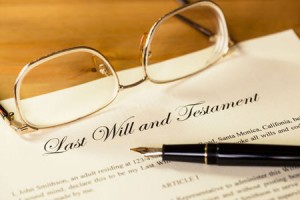September 2016: Your will and a practical plan for your loved ones

“Where there’s a will, I want to be in it” (Anon)
Whether you are young or old, healthy or ill, single or attached, you should have a Will. Without one, you die “intestate”, which means you forfeit your right to decide who inherits what, who administers and distributes your estate, and who looks after your children and their money. You owe it to your loved ones to spare them the inevitable financial and personal risks.
So if you don’t yet have a Will get one drawn up immediately.
Here’s a practical guide to making sure that it will protect and provide for your loved ones properly.
Do it properly with a professional
Don’t be tempted to use a template Will or to copy a friend’s; there is just too much at stake here to take any chances. Apart from all the legal formalities involved, there are a multitude of practical considerations that all call for professional help.
Badly drawn Wills risk outright invalidity, reduced tax and estate planning efficiency, confusion, doubt and dispute - our law reports are replete with bitter and costly family feuds that would have been avoided with a properly drawn and executed Will.
Appoint the right executor/s
Your estate will be administered and distributed by an executor or executors. If you decide to nominate a non-professional such as your spouse, he/she will need professional assistance so consider appointing a specialist as joint executor. Choose someone you can trust to act with absolute integrity and professionalism – you will no longer be around to keep an eye on them!
A practical plan for your loved ones
Firstly, all your bank accounts and other assets will be frozen when the executors take control and deceased estates take a long time to wind up. So check that your dependents will have enough on hand to tide them over for at least several months’ worth of living expenses. Take advice on how best to do this – common solutions include separate bank accounts and investments, life assurance policies that will pay out directly to dependents on your death, and family trusts.
Secondly, when you die your family will be in shock. Help them through the stress and anxiety of bereavement by keeping a file with everything listed below -
- Right in front put a list of the names and contact details of everyone you can think of who your family can and should turn to for support and advice – your lawyer, accountant, tax adviser, insurance broker, medical aid specialist, doctor, financial adviser, investment manager, bank contact, employers, employees, business partners and so on
- Next, a copy of your Will and contact details for your executor (who should keep the original Will in safe custody)
- If you have particular wishes in regard to funeral arrangements, cremation etc, leave a signed directive giving details (or referring to any instructions in your Will)
- Medical aid details and details of any funeral policy
- Copies of ID documents – for you, your spouse, your children, other dependents or heirs, guardians etc
- Important family documents like marriage certificates, ANCs, cohabitation agreements, divorce orders and so on
- A full list of your assets (give detailed descriptions of any important assets, and don’t forget full details of any loans made to family members) and your liabilities
- Details of all bank and savings accounts, credit cards, investments, life policies, pension funds, retirement annuities and the like
- Information on entities like companies and trusts in which you or your family have any interest or involvement
- A list of all monthly recurring liabilities, debit orders etc
- Important documents relating to your assets and liabilities – title deeds, vehicle registration papers, rental agreements, loan agreements, insurance policies, tax returns, tax records – really anything your family or executor may need to access quickly and easily
- Notes on the location of things like safes, spare key boxes, security documents, firearm cabinets etc, and of the keys or codes needed to access them (see under “Passwords” below for ideas on doing this securely)
- A note on how to access passwords, PIN numbers and access codes, which are a big issue in our electronic age but often overlooked. Don’t make that mistake - your loved ones will need access to your computers, your cell phone, your online accounts, your email, your online payment portal, your Social Media pages and so on. For some ideas on how to do this securely read “Making Life Easier for Your Heirs in a Digital World” on Siller & Cohen’s website. If you use a password manager like LastPass www.lastpass.com look for functions like “Emergency Access” to share your passwords with your heirs, and “Secure Notes” to share information like PINs, safe and alarm codes, location of keys etc
- Anything and everything else your loved ones or advisers may need to know about – ask them if they can think of anything to add.
Where your file contains copies of documents rather than originals, say clearly where the originals are kept.
Put your file somewhere safe then tell everyone where to find it and how to access it (it’s no good telling them it’s in your safe if they don’t know where to find the safe key!).
Diarise regular reviews
All sorts of life events - marriage, divorce, deaths, births, adoptions, retirement, new family circumstances and the like – call for amendment of your Will. So diarise regular reviews and again take full professional advice on how to make any changes both validly and to best advantage.
Click to read the full September newsletter


